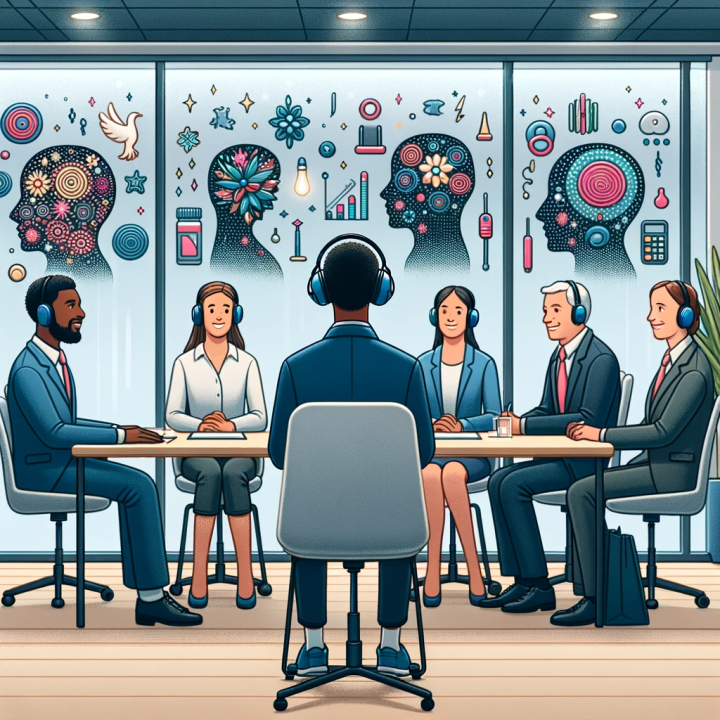
Access our content in a way that suits you best.Including text-to-speech, reading and translation support.

Access our content in a way that suits you best.Including text-to-speech, reading and translation support.
In today's diverse workplace, fostering inclusivity begins right at the recruitment stage. Embracing neurodiversity in the hiring process is not only ethically important, but also a strategic advantage, as it brings unique perspectives and talents to the team. As companies increasingly recognise the value of diversity, it's essential to ensure that recruitment practices are not only inclusive but also actively seek out neurodiverse talent. But how do we do that?
1: Diversify Recruitment Channels:
Partnering with organisations or job boards specifically tailored to neurodiverse individuals is a crucial step in expanding the reach of job postings. Platforms like Ambitious About Autism or Autism Forward provide a space for individuals to connect with employers who value their unique skills and perspectives. Additionally, collaborating with local disability support organisations or vocational rehabilitation services can help tap into talent pools that may otherwise go untapped.
Ensuring that job postings use inclusive language and imagery is essential for attracting a broad range of applicants. Avoiding jargon and acronyms, and clearly outlining the job requirements and expectations can help neurodivergent candidates better understand the role and assess their fit. Including images or videos that showcase the workplace culture and accommodations available can also help candidates feel more comfortable and confident in applying.
Result: By diversifying recruitment channels and using inclusive language and imagery, employers can increase visibility among neurodivergent talent pools and improve the likelihood of attracting qualified candidates.
2. Provide Clear and Accessible Application Processes:
Simplifying online application forms with clear instructions and user-friendly interfaces is critical for ensuring that neurodivergent candidates can navigate the application process smoothly. Using plain language, providing step-by-step guidance, and minimising distractions can help reduce barriers and ensure that all applicants have an equal opportunity to apply.
Offering options for candidates to disclose any accommodations they may require during the recruitment process demonstrates a commitment to accessibility and inclusivity. Providing a dedicated space on the application form for candidates to specify their needs and preferences ensures that accommodations can be arranged in advance, allowing candidates to fully participate in the selection process.
Result: By providing clear and accessible application processes, employers can improve accessibility and reduce barriers for candidates, leading to a more diverse applicant pool.
3. Conduct Neurodiversity Training for Recruitment Teams:
Providing training on neurodiversity awareness and best practices for accommodating a neurodiverse pool of candidates is essential for ensuring that recruiters understand the unique strengths and challenges of neurodivergent individuals. Training sessions can cover topics such as common neurodevelopmental conditions, communication differences, and strategies for creating inclusive interview environments.
Offering guidance on conducting inclusive interviews and assessments that consider diverse communication styles and sensory sensitivities helps ensure that candidates are evaluated fairly and accurately. Providing interviewers with resources and tools, such as interview question prompts or communication guides, can help them adapt their approach to better meet the needs of candidates.
Result: By conducting neurodiversity training for recruitment teams, employers can increase empathy and understanding among recruiters, leading to fairer evaluations and improved candidate experiences.
4.Consider Alternative Assessment Methods:
Exploring skills-based assessments or work samples as alternative evaluation methods can provide a more accurate and comprehensive measure of candidates' abilities. These assessments focus on demonstrating practical skills and abilities relevant to the role, rather than relying solely on traditional interview questions or standardised tests.
Offering flexibility in assessment formats and settings to accommodate diverse needs demonstrates a commitment to inclusivity and accessibility. Providing candidates with options such as completing assessments remotely, requesting accommodations, or choosing alternative assessment methods allows them to showcase their abilities in a way that best suits their individual preferences and needs.
Result: By considering alternative assessment methods and offering flexibility, employers can ensure more accurate assessments of candidates' abilities and potential, leading to better hiring decisions.
5. Foster a Supportive Interview Environment:
Providing clear directions and expectations before the interview, along with information on available accommodations, helps candidates feel more prepared and confident. Offering breaks or adjustments as needed during the interview process demonstrates a commitment to meeting candidates' needs and ensuring a positive experience.
Encouraging interviewers to focus on building rapport and establishing a comfortable dialogue with candidates helps create a supportive and inclusive interview environment. Emphasising active listening, asking open-ended questions, and providing opportunities for candidates to ask questions or seek clarification can help candidates feel valued and respected throughout the interview process.
Result: By fostering a supportive interview environment, employers can increase confidence and performance from neurodivergent candidates, leading to more accurate evaluations and better hiring outcomes.
Conclusion: Incorporating these practices into the recruitment process can make a significant difference in attracting and retaining neurodiverse talent. By embracing neurodiversity from the outset, employers not only create a more inclusive workplace but also tap into a more diverse pool of skills and perspectives.
